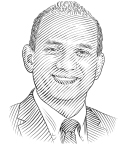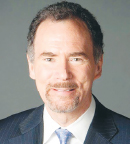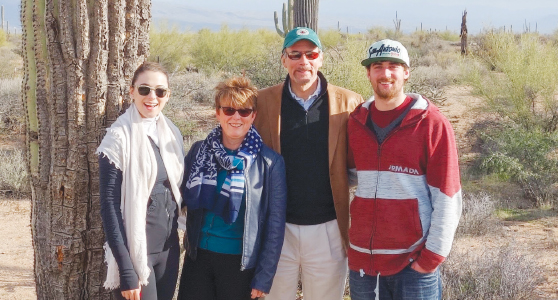GUEST EDITOR

Jame Abraham, MD
Dr. Abraham is the Director of the Breast Oncology Program at Taussig Cancer Institute, and Professor of Medicine, Lerner College of Medicine, Cleveland Clinic.
For this installment of the Living a Full Life series, guest editor Jame Abraham, MD, interviewed Mace L. Rothenberg, MD, Chief Development Officer for Oncology and Senior Vice President, Global Product Development at Pfizer. Dr. Rothenberg joined Pfizer in December 2008 after a 20-year career in academia spent at the National Cancer Institute, The University of Texas Health Science Center at San Antonio, and Vanderbilt University Medical Center.

Mace L. Rothenberg, MD
Dr. Rothenberg first came to Vanderbilt University Medical Center in 1982 for his internship and residency in internal medicine after obtaining his medical degree from the New York University School of Medicine. He did his medical oncology fellowship at the National Cancer Institute (NCI) and was selected by Bruce A. Chabner, MD, to be a special assistant to the NCI’s Director of the Division of Cancer Treatment from 1988 to 1991. He then spent 7 years on the faculty of The University of Texas Health Science Center in San Antonio and as Executive Director of SWOG. Dr. Rothenberg returned to Vanderbilt, where he was Professor of Medicine and Ingram Professor of Cancer Research. During this period, his focus was on phase I drug development and the translation of new scientific insights into new clinical therapies for pancreatic and colorectal cancers.
Move to Industry
In October 2008, Dr. Rothenberg was named Head of Clinical Development and Medical Affairs for Pfizer’s Oncology Business Unit, which combined with his previous tenure in academic oncology, gives him a multifaceted perspective on cancer treatment and drug development. Admittedly, it was a tough decision to leave academic oncology and patient care. “I felt it was an opportunity that could allow me to have the greatest impact on improving patient outcomes,” said Dr. Rothenberg. “The company had just made a big commitment to oncology, and I wanted to be part of it.”
Dr. Rothenberg continued: “There are a number of similarities between industry and academic oncology as both emphasize rigor, collaboration, accountability, and a sense of urgency. That was true for the phase I team and the translational research that we did at Vanderbilt through the GI SPORE, and it’s certainly true in the drug development arena at Pfizer.”
Golden Age of Oncology
Dr. Rothenberg, who entered the field of oncology in the mid-1980s, looked back and marveled at the gains made during the arc of his career. He noted that early in his career, the trend was on dose intensity: to increase the dose of chemotherapy to maximize response rates and to manage the severe toxicities that came with it. At that time, it was difficult to imagine how targeted therapies, precision medicine, and immunotherapy would radically change the landscape and improve the outlook for patients, many of whom had aggressive, difficult-to-treat cancers. “Early in my career, although very optimistic at the accelerating pace of cancer research and advances in cancer therapy, I never imagined we’d come this far in advancing cancer treatment with the new modalities that can control and, in some cases, cure a number of advanced cancers. I never lose sight of the fact that this is a golden age of oncology,” said Dr. Rothenberg.
He stressed that the major advances of the past few decades are not the result of singular events or discoveries but rather athe accumulation of knowledge that was then incorporated into new theories of cancer biology and treatments. “I’ve been fortunate to be involved with Pfizer, which made a commitment to become a leader in the field of oncology. But it takes more than just a commitment; it takes an extraordinary amount of patience to develop and bring drugs to market. But I’m glad to say the commitment has paid off, and during my tenure at Pfizer, we have brought seven exciting new compounds to the cancer market,” said Dr. Rothenberg. He added: “And that’s just been wonderful to have been part of a team that’s brought these medicines forward and helped some of the patients I used to see and treat live longer, better, more productive lives.”
Key Strategies Moving Forward
Asked what key components were needed to improve the experience of individuals diagnosed with cancer, Dr. Rothenberg said: “It’s vitally important for patients to understand the many resources that are available to them. There is more extremely useful information available at our fingertips than ever before. And it surprises and saddens me when individuals who are so capable of navigating the Internet just miss that opportunity. We need to ensure that patients are aware of the vast array of resources that are available to them, which will both inform and empower them.”
MACE L. ROTHENBERG, MD
On Move to Industry:“This was not something I was looking for, but after giving it careful consideration, I felt it was an extraordinary opportunity at the right time in my career. The potential to deliver on the promise of precision medicine and directly benefit patients around the world was irresistible. I wanted to be part of it.”
On Patient Resources: “There are great resources available to patients through advocacy groups, nonprofit organizations, and professional organizations. It surprises and saddens me when individuals who are so capable of navigating the Internet don’t take full advantage of it. We have to do more to connect patients to these resources.”
Ways to Unwind: “There are a variety of things I do, but one common theme is that they allow me to detach from the work events of the day, even if just for a little while. Whether it involves physical exercise, reading a book, or being with my family, it’s important to have time to unplug and refresh.”
Dr. Rothenberg noted that accurate information from support groups, not-for-profit organizations, and advocacy organizations is vital to patients diagnosed with cancer, many of whom are overwhelmed with anxiety and questions about their diagnosis and options for care. “No one prepares to be a cancer patient. We’re parents, factory workers, and business people, and we all have our normal lives. Suddenly one word changes everything: cancer. It’s an overwhelming experience and people just don’t know what to do. That’s why it’s imperative to help patients educate themselves so they can better understand their options and be full partners in decisions regarding their treatment,” said Dr. Rothenberg.
He continued: “Helping the patient understand where they are in the process is vital from the outset. The way I described it to patients was that during the first week or so, tests would be conducted to determine where the cancer is and where it isn’t. After that, we would know the stage of the cancer and could then sit down to discuss a plan of care appropriate for their type and stage of cancer. Then we would move into the treatment stage of care. During treatment, how they were tolerating treatment and the effect of treatment on their cancer would be monitored carefully, with adjustments made along the way as needed. Taking the few minutes to step a patient through each part of this process went a long way in alleviating their anxieties.
And the last thing, but perhaps most important, was to let them know that we’re in this together. I’m there to help them understand their options and recommend treatments, but they’re active partners as well. They need to tell me what problems they’re having and how they feel. If at any point they feel they don’t want to proceed with one line of therapy or another, they don’t have to. They are the boss; if they say stop, we can stop. But if they’re having side effects, they need to tell us, so we can manage and alleviate them and work effectively together,” he explained.
Dr. Rothenberg said he used to counsel his patients on the importance of clinical trial participation, noting that the patient population to this day remains unclear about trials, viewing them largely as a “last ditch resort.”
“And the last thing, but perhaps most important, is to let them know that we’re in this together. I’m there to help them understand their options and recommend treatments, but they’re active partners as well. They need to tell me what problems they’re having, how they feel, and if at any point they feel they don’t want to proceed with one line of therapy or another. They are the boss; if they say stop, we can stop. But if they’re having side effects, they need to tell us, so we can manage them and work effectively together,” he explained.
Bringing Patient Care Experience to Patient Care Industry
According to Dr. Rothenberg, many of the skills he acquired during his training and career in academic oncology provided important perspective and insight as he transitioned to the pharmaceutical industry. “At Pfizer, or other companies in the industry, it’s easy to look at tables reporting efficacy rates and the frequency and severity of adverse events. But there is no substitute for having someone with direct patient experience explain what the figures don’t tell us, what more we need to know, and how we can ensure the most favorable balance between benefit and risk. Incorporating patient-reported outcomes, for instance, can provide a fuller picture of the impact of new therapies on patients.”
There are a number of similarities between industry and academic oncology, as both emphasize rigor, collaboration, accountability, and a sense of urgency.— Mace L. Rothenberg, MD
Tweet this quote
Asked to share a specific overlap between academia and industry, Dr. Rothenberg replied: “In academia, we have multispecialty tumor boards, where experts in a specific disease gather together to come up with the optimal cancer management plan for that patient. In industry, we also have a similar kind of multispecialty group, but instead of having pathologists, radiologists, medical oncologists, and surgeons around the table, we have people who are experts in clinical trial design, safety assessment, regulatory requirements, and commercial considerations around the world. I have found that same type of give-and-take interactions that enable us to make the best decision regarding the development and impact of our medicines. I enjoyed the collaborative interaction in academia and certainly do at Pfizer.”
Dr. Abraham asked whether there were any stark differences in his transition to industry. Dr. Rothenberg said: “The one big difference was that at each step in my career in academia, the previous training and experience prepared me for the next one. In shifting from academia to industry, I realized I didn’t have formal training in some of the areas that were going to be important: things such as finance, worldwide regulatory perspectives and the specific needs of various regions, patient access, contracts, and the level of rigor expected of sponsors by regulatory agencies in the oversight of drug-development activities. Frankly, despite a career in drug development, I was surprised at how much I didn’t know about it. It was a bit disorienting at first, but I was fortunate to have joined an organization that was nurturing and supportive of someone new to industry. As time passed, I began to understand all of the elements that needed to be considered in making critical decisions and how best I could contribute to those discussions.”
A Day in the Life
Although each day in Dr. Rothenberg’s leadership role brings new challenges that require flexibility, Dr. Abraham asked him to share with readers a sense of his workload. “No two days are alike. Today I started out with a meeting about ways to incorporate worldwide regulatory requirements into the clinical development plans for one of our new medicines. Then I met with one of my team members to discuss a clinical trial that was having difficulty recruiting patients, exploring the reasons behind that and agreeing on steps to take to overcome it. I then had a meeting about how best to meet the regulatory needs in the clinical development of two medicines in China. That was followed with a meeting with my peers in Global Product Development to discuss the progress we are making to improve collegial pride and satisfaction at Pfizer. The day’s final meeting explored novel strategies to test our medicines in the pipeline in more efficient and robust ways. Even though each meeting covered different issues and involved different colleagues, the common theme was involving the right individuals representing a variety of disciplines to ensure that we were making the most informed decision possible.”

Dr. Rothenberg in Sedona, Arizona, with his wife Joyce, daughter Stephanie, and son Bryce.
Along with his grueling in-house schedule, Dr. Rothenberg also travels extensively to Pfizer’s research and production facilities around the globe. Asked what he does to de-stress, Dr. Rothenberg replied: “A lot of time is spent in meetings, so I try to get some physical exercise every day, whether that involves going to the gym—which I don’t do as often as I should—or getting off the subway a stop early and walking the last 10 blocks to work, which I try to do every day. I love to read and just finished a wonderful biography of Abraham Lincoln by Ronald White. And lastly, given the seriousness of the work we do, I try to find something that makes me laugh out loud every day. I’m amazed at how quickly that can make me feel better, even after a trying day.”
Most of all, he added, his family is key. “The one thing that grounds me is spending time with my family, hearing about their achievements and helping them work through challenges. My wife and I just returned from a safari that took me away from work for 2 weeks, something I haven’t done in many years,” he said.
What advice does Dr. Rothenberg have for a fellow or junior faculty member who is trying to decide on a career path? “It centers on what gets you out of bed in the morning. If you enjoy treating patients and knowing that what you’re doing is of benefit to them, you should definitely be in patient care. Academia is the place for those whose passion is asking and answering scientific and medical questions that could advance the field and improve patients’ outcomes. For those who want to take responsibility for designing a clinical trial or an entire drug-development program or developing a plan to ensure that we understand the full potential of a new medicine once it reaches the market, it might be worthwhile to consider a position in industry. But regardless of the specific career path one takes, the constant is that the patient is always at the center of what we do.”■
DISCLOSURE: Dr. Rothenberg reported no conflicts of interest.
Living a Full Life: Let Us Hear From You
We encourage you to contact us if you would like to be interviewed about your own experiences and interests or would like to nominate a candidate. We are seeking to learn what motivates and inspires you and how you manage to achieve balance in your own life.
Write to editor@ASCOPost.com and reference Living a Full Life.

